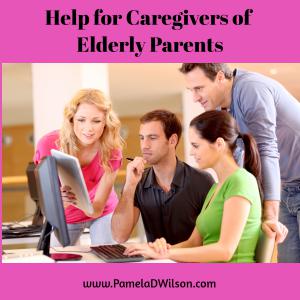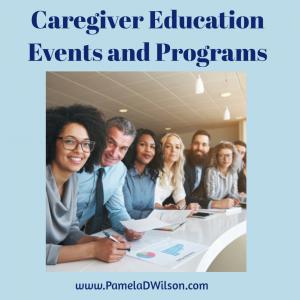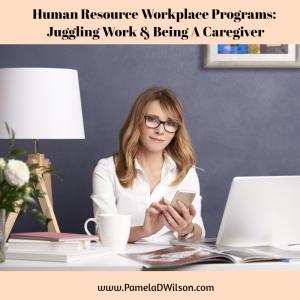Best Video Conferencing and Caregiving Programs Offered by Pamela D Wilson
Wilson's caregiving programs increase awareness of caregiving responsibilities and help caregivers manage day-to-day care for elderly parents and spouses
GOLDEN, CO, USA, May 11, 2020 /EINPresswire.com/ -- Video conferencing and caregiver programs offered by Pamela D Wilson provide practical tips and tools for 72% of consumers who use the Internet to obtain healthcare and related information. Google receives more than 1 billion health questions every day.
A Caregiver’s Work is Never-Ending
Being a caregiver is emotionally draining, challenging, and time-consuming. Unexpected situations result in adult children caring for elderly parents or a spouse caring for a spouse. Many caregivers say that the responsibilities of being a caregiver are shocking. Taking caregiving tasks and responsibilities one day at a time by juggling work and caregiving is how many caregivers cope.
In most families, in addition to a healthy spouse caring for a sick spouse, one adult child becomes the primary caregiver. This adult child caregiver does it on his or her own without the help of siblings who may not have the time or want to become involved.
Hands-on care tasks like bathing, dressing, feeding, helping elderly parents to the toilet, providing medical care like dressing wounds, and managing incontinence are part of a caregiver's day. Female caregivers—representing 60% of caregivers—feel a responsibility to perform personal care tasks. Male caregivers are more comfortable hiring support for these tasks. The majority of caregivers who provide care on their own have no paid help.
Being a Caregiver is Time Consuming
Thirty percent of caregivers spend more than 40 hours a week providing care for a spouse or elderly parent. The majority of caregivers spend at least 20 hours a week providing care, adding up to a part- or a full-time job in addition to being employed.
Ways to use time more efficiently, create a financial budget for care, become more confident in managing health matters, navigating the healthcare system, arranging or supervising paid services, and making legal decisions are routine matters that become overwhelming for many caregivers.
Caregivers become frustrated when they seek help and experience problems with hiring in-home care providers. Hours spent calling insurance companies, coordinating medications, and medical care with doctor’s offices can consume an entire day. Some healthcare providers seem more like the prevention department rather than help in providing care for loved ones.
Video Conferencing and Caregiving Programs
Wilson’s experience of more than 20 years in the aging field as a court-appointed guardian, medical and financial power of attorney, and care manager in addition to personal life experience as a family caregiver offers solutions for caregivers. Broadcast-quality video conferencing programs for corporations desiring to support working caregivers bring awareness to the roles and responsibilities of caregiving. Caregiving programs and support offered by Wilson provide proven systems and solutions for the day to day issues that challenge many caregivers.
Caregiver Burnout Results in Feeling Lost and Without Hope
Family caregivers who keep going day after day don’t realize the physical and emotional toll of caring for a spouse or an elderly parent. Waking up each day and starting the same routine can feel like a struggle. Caregivers feel unprepared and lack the confidence to perform many of the tasks that are required.
Caregiver programs offer needed support to help caregivers develop routines for self-care so that they can continue to care for spouses and elderly parents. In many cases, caregivers lack awareness that support programs exist. When caregivers find programs, many require in-person attendance, which is not possible when caregivers work full-time. Other caregivers who live in less populated areas may not have programs in the communities where they live.
Online Course and Caregiver Support From Pamela D Wilson
Lack of awareness, in addition to time, is the most common barrier to caregivers seeking support. While the Internet offers abundant information about healthcare and caregiving, caregivers working full-time and caring for elderly parents part- or full time don’t have hours to spend on the Internet seeking information.
Wilson’s online course and caregiver support options make it convenient for caregivers to participate in caregiver programs and to receive much-needed assistance. The Stay at Home program offers a start to finish plan to manage care for loved ones based on Wilson’s experience of managing care for her clients. All of the information caregivers need is in a single course for caregivers.
Wilson’s programs provide recommendations for managing many of the daily tasks that caregivers perform, including creating schedules, care plans, budgets, managing medications, interviewing in-home care providers, and navigating the healthcare system. While not all caregivers are at the same stage of managing care, the Stay at Home program is designed to increase awareness from the early stages of caregiving to end of life situations. Caregivers can review course materials and come back to review relevant portions as situations of caregiving advance.
More information about Wilson’s virtual caregiving support solutions, on-site keynotes, and broadcast-quality video conferencing presentations and webinars are available on her website at www.PamelaDWilson.com or by calling 303-810-1816.
Pamela D. Wilson
Pamela D. Wilson, Inc.
+1 303-810-1816
email us here
Visit us on social media:
Facebook
Twitter
LinkedIn
10 Things All Caregivers and Aging Adults Should Know



